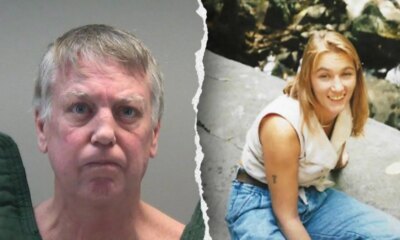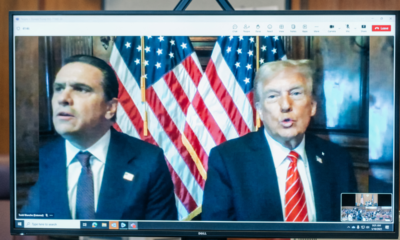Business
The New York Fed President Sees Interest Rates Coming Down With Inflation

The third thing is that — I think our monitoring of these markets, and study of these markets, has taken lessons from that experience. Even then, we focused a lot on market intelligence and things, but now we have a lot more analytical tools that can tell us — what are some of the warning signs, that even though markets are functioning well, there are signs that interest rates are getting more sensitive to the daily ups and downs. There’s some research we’ve done here at the New York Fed that’s really trying to develop some statistical methods, saying — hey, you know, everyday we’re seeing more volatility in market interest rates when things happen, maybe that’s a sign that we’re getting closer to ample reserves. We saw some of those signs in 2018, 2019. We saw some of those things, but it wasn’t as clear maybe that — because markets were functioning so well, it wasn’t as clear at the time that maybe there was perhaps less elasticity in those markets when the shocks kind of got bigger.
When you survey financial markets right now, what keeps you up at night?
There are different versions of that question. I always say that the one that’s number one on my list, mainly because it’s so hard to know, is really cybersecurity issues — cyber risks. Obviously, there’s a lot of work that goes in at the financial institutions, here at the Federal Reserve and at other central banks, we put a lot of effort into making sure that our systems and the financial system is secure, but there’s also a lot of effort to break into that, or create risk to the financial system that way. So that’s just something that’s always on our mind, my mind, and it’s something that we’re very focused on, there.
I think the other concerns, that come up, is — we look at the Treasury market. The U.S. Treasury market is the number one, central, most core market in the global economy. As we saw in the spring of 2020, if the Treasury market is not functioning well, other markets don’t function well, and we watched — over many years — as liquidity in the Treasury market has come down to lower levels as the market players there and how the market dynamics work there has changed over time, and that has led, at different points in time, to greater sensitivity to interest rates, to sudden changes in interest rates, due to various shocks that happen. So I think that’s another concern. Anything we, broadly, in government can do to strengthen the resilience in liquidity in the Treasury market and other closely-related markets I think is very important because it’s just so core to everything.
I don’t go back to March of 2020, and say, well: We saw that, we have to protect against March of 2020 as the one example, or the one data point. Because that is so extreme, what happened then in kind of the dash-for-cash kind of set of issues. But I look at the broader context. Well before the pandemic, there were clearly events in Treasury markets that gave concern about liquidity there, and they have occurred since, so I think that’s a number two area that we want to make sure we invest in.
I would say the third, which I will just now cross off officially, was the Libor transition. That took a long time, about 10 years, but Libor was a fundamentally flawed reference rate that was used in hundreds of trillions of financial instruments. It was an incredibly hard project to move off of that, and it was to me one of the top financial sector risks. And — we’ve moved off of it in the U.S., and globally moved away from a lot of those types of reference rates to much more robust, resilient reference rates. In the US, SOFR has taken over that. And to me, that is a great success, but it’s also kind of a reminder that things can creep up on you over years. Because LIBOR started as a relatively small thing and then spread, and spread, to the point where nobody, I’m sure, in the 1980s thought that this was going to be a $400 trillion thing — so just keeping an eye on things that are small but that are growing over time, is another thing.

Business
Cookies, Cocktails and Mushrooms on the Menu as Justices Hear Bank Fraud Case

In a lively Supreme Court argument on Tuesday that included references to cookies, cocktails and toxic mushrooms, the justices tried to find the line between misleading statements and outright lies in the case of a Chicago politician convicted of making false statements to bank regulators.
The case concerned Patrick Daley Thompson, a former Chicago alderman who is the grandson of one former mayor, Richard J. Daley, and the nephew of another, Richard M. Daley. He conceded that he had misled the regulators but said his statements fell short of the outright falsehoods he said were required to make them criminal.
The justices peppered the lawyers with colorful questions that tried to tease out the difference between false and misleading statements.
Chief Justice John G. Roberts Jr. asked whether a motorist pulled over on suspicion of driving while impaired said something false by stating that he had had one cocktail while omitting that he had also drunk four glasses of wine.
Caroline A. Flynn, a lawyer for the federal government, said that a jury could find the statement to be false because “the officer was asking for a complete account of how much the person had had to drink.”
Justice Ketanji Brown Jackson asked about a child who admitted to eating three cookies when she had consumed 10.
Ms. Flynn said context mattered.
“If the mom had said, ‘Did you eat all the cookies,’ or ‘how many cookies did you eat,’ and the child says, ‘I ate three cookies’ when she ate 10, that’s a false statement,” Ms. Flynn said. “But, if the mom says, ‘Did you eat any cookies,’ and the child says three, that’s not an understatement in response to a specific numerical inquiry.”
Justice Sonia Sotomayor asked whether it was false to label toxic mushrooms as “a hundred percent natural.” Ms. Flynn did not give a direct response.
The case before the court, Thompson v. United States, No. 23-1095, started when Mr. Thompson took out three loans from Washington Federal Bank for Savings between 2011 and 2014. He used the first, for $110,000, to finance a law firm. He used the next loan, for $20,000, to pay a tax bill. He used the third, for $89,000, to repay a debt to another bank.
He made a single payment on the loans, for $390 in 2012. The bank, which did not press him for further payments, went under in 2017.
When the Federal Deposit Insurance Corporation and a loan servicer it had hired sought repayment of the loans plus interest, amounting to about $270,000, Mr. Thompson told them he had borrowed $110,000, which was true in a narrow sense but incomplete.
After negotiations, Mr. Thompson in 2018 paid back the principal but not the interest. More than two years later, federal prosecutors charged him with violating a law making it a crime to give “any false statement or report” to influence the F.D.I.C.
He was convicted and ordered to repay the interest, amounting to about $50,000. He served four months in prison.
Chris C. Gair, a lawyer for Mr. Thompson, said his client’s statements were accurate in context, an assertion that met with skepticism. Justice Elena Kagan noted that the jury had found the statements were false and that a ruling in Mr. Thompson’s favor would require a court to rule that no reasonable juror could have come to that conclusion.
Justices Neil M. Gorsuch and Brett M. Kavanaugh said that issue was not before the court, which had agreed to decide the legal question of whether the federal law, as a general matter, covered misleading statements. Lower courts, they said, could decide whether Mr. Thompson had been properly convicted.
Justice Samuel A. Alito Jr. asked for an example of a misleading statement that was not false. Mr. Gair, who was presenting his first Supreme Court argument, responded by talking about himself.
“If I go back and change my website and say ‘40 years of litigation experience’ and then in bold caps say ‘Supreme Court advocate,’” he said, “that would be, after today, a true statement. It would be misleading to anybody who was thinking about whether to hire me.”
Justice Alito said such a statement was, at most, mildly misleading. But Justice Kagan was impressed.
“Well, it is, though, the humblest answer I’ve ever heard from the Supreme Court podium,” she said, to laughter. “So good show on that one.”
Business
SEC probes B. Riley loan to founder, deals with franchise group

B. Riley Financial Inc. received more demands for information from federal regulators about its dealings with now-bankrupt Franchise Group as well as a personal loan for Chairman and co-founder Bryant Riley.
The Los Angeles-based investment firm and Riley each received additional subpoenas in November from the U.S. Securities and Exchange Commission seeking documents and information about Franchise Group, or FRG, the retail company that was once one of its biggest investments before its collapse last year, according to a long-delayed quarterly filing. The agency also wants to know more about Riley’s pledge of B. Riley shares as collateral for a personal loan, the filing shows.
B. Riley previously received SEC subpoenas in July for information about its dealings with ex-FRG chief executive Brian Kahn, part of a long-running probe that has rocked B. Riley and helped push its shares to their lowest in more than a decade. Bryant Riley, who founded the company in 1997 and built it into one of the biggest U.S. investment firms beyond Wall Street, has been forced to sell assets and raise cash to ease creditors’ concerns.
The firm and Riley “are responding to the subpoenas and are fully cooperating with the SEC,” according to the filing. The company said the subpoenas don’t mean the SEC has determined any violations of law have occurred.
Shares in B. Riley jumped more than 25% in New York trading after the company’s overdue quarterly filing gave investors their first formal look at the firm’s performance in more than half a year. The data included a net loss of more than $435 million for the three months ended June 30. The shares through Monday had plunged more than 80% in the past 12 months, trading for less than $4 each.
B. Riley and Kahn — a longstanding client and friend of Riley’s — teamed up in 2023 to take FRG private in a $2.8-billion deal. The transaction soon came under pressure when Kahn was tagged as an unindicted co-conspirator by authorities in the collapse of an unrelated hedge fund called Prophecy Asset Management, which led to a fraud conviction for one of the fund’s executives.
Kahn has said he didn’t do anything wrong, that he wasn’t aware of any fraud at Prophecy and that he was among those who lost money in the collapse. But federal investigations into his role have spilled over into his dealings with B. Riley and its chairman, who have said internal probes found they “had no involvement with, or knowledge of, any alleged misconduct concerning Mr. Kahn or any of his affiliates.”
FRG filed for Chapter 11 bankruptcy in November, a move that led to hundreds of millions of dollars of losses for B. Riley. The collapse made Riley “personally sick,” he said at the time.
One of the biggest financial problems to arise from the FRG deal was a loan that B. Riley made to Kahn for about $200 million, which was secured against FRG shares. With that company’s collapse into bankruptcy in November wiping out equity holders, the value of the remaining collateral for this debt has now dwindled to only about $2 million, the filing shows.
Griffin writes for Bloomberg.
Business
Starbucks Reverses Its Open-Door Policy for Bathroom Use and Lounging

Starbucks will require people visiting its coffee shops to buy something in order to stay or to use its bathrooms, the company announced in a letter sent to store managers on Monday.
The new policy, outlined in a Code of Conduct, will be enacted later this month and applies to the company’s cafes, patios and bathrooms.
“Implementing a Coffeehouse Code of Conduct is something most retailers already have and is a practical step that helps us prioritize our paying customers who want to sit and enjoy our cafes or need to use the restroom during their visit,” Jaci Anderson, a Starbucks spokeswoman, said in an emailed statement.
Ms. Anderson said that by outlining expectations for customers the company “can create a better environment for everyone.”
The Code of Conduct will be displayed in every store and prohibit behaviors including discrimination, harassment, smoking and panhandling.
People who violate the rules will be asked to leave the store, and employees may call law enforcement, the policy says.
Before implementation of the new policy begins on Jan. 27, store managers will be given 40 hours to prepare stores and workers, according to the company. There will also be training sessions for staff.
This training time will be used to prepare for other new practices, too, including asking customers if they want their drink to stay or to go and offering unlimited free refills of hot or iced coffee to customers who order a drink to stay.
The changes are part of an attempt by the company to prioritize customers and make the stores more inviting, Sara Trilling, the president of Starbucks North America, said in a letter to store managers.
“We know from customers that access to comfortable seating and a clean, safe environment is critical to the Starbucks experience they love,” she wrote. “We’ve also heard from you, our partners, that there is a need to reset expectations for how our spaces should be used, and who uses them.”
The changes come as the company responds to declining sales, falling stock prices and grumbling from activist investors. In August, the company appointed a new chief executive, Brian Niccol.
Mr. Niccol outlined changes the company needed to make in a video in October. “We will simplify our overly complex menu, fix our pricing architecture and ensure that every customer feels Starbucks is worth it every single time they visit,” he said.
The new purchase requirement reverses a policy Starbucks instituted in 2018 that said people could use its cafes and bathrooms even if they had not bought something.
The earlier policy was introduced a month after two Black men were arrested in a Philadelphia Starbucks while waiting to meet another man for a business meeting.
Officials said that the men had asked to use the bathroom, but that an employee had refused the request because they had not purchased anything. An employee then called the police, and part of the ensuing encounter was recorded on video and viewed by millions of people online, prompting boycotts and protests.
In 2022, Howard Schultz, the Starbucks chief executive at the time, said that the company was reconsidering the open-bathroom policy.
-

 Health1 week ago
Health1 week agoOzempic ‘microdosing’ is the new weight-loss trend: Should you try it?
-
/cdn.vox-cdn.com/uploads/chorus_asset/file/25822586/STK169_ZUCKERBERG_MAGA_STKS491_CVIRGINIA_A.jpg)
/cdn.vox-cdn.com/uploads/chorus_asset/file/25822586/STK169_ZUCKERBERG_MAGA_STKS491_CVIRGINIA_A.jpg) Technology6 days ago
Technology6 days agoMeta is highlighting a splintering global approach to online speech
-

 Science4 days ago
Science4 days agoMetro will offer free rides in L.A. through Sunday due to fires
-
/cdn.vox-cdn.com/uploads/chorus_asset/file/25821992/videoframe_720397.png)
/cdn.vox-cdn.com/uploads/chorus_asset/file/25821992/videoframe_720397.png) Technology1 week ago
Technology1 week agoLas Vegas police release ChatGPT logs from the suspect in the Cybertruck explosion
-

 Movie Reviews1 week ago
Movie Reviews1 week ago‘How to Make Millions Before Grandma Dies’ Review: Thai Oscar Entry Is a Disarmingly Sentimental Tear-Jerker
-

 Health1 week ago
Health1 week agoMichael J. Fox honored with Presidential Medal of Freedom for Parkinson’s research efforts
-

 Movie Reviews1 week ago
Movie Reviews1 week agoMovie Review: Millennials try to buy-in or opt-out of the “American Meltdown”
-

 News1 week ago
News1 week agoPhotos: Pacific Palisades Wildfire Engulfs Homes in an L.A. Neighborhood

















